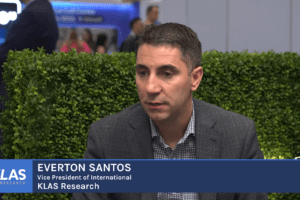@tstettheimer reminds me of someone who asked me why there weren’t younger people at #CHIME12 so they could be mentored.
— EMR, EHR and HIT(@ehrandhit) October 19, 2012
What’s really interesting about my tweet above is that the person that asked me why their weren’t young people at CHIME was actually the wife of someone attending CHIME. She was a healthcare IT outsider that was just observing the situation from the outside.
It’s a very good question and all that I could tell this nice lady was, I don’t know. The reality is that CHIME and all the other major health IT conferences should be embracing and facilitating the next generation of health IT leaders. If they don’t then healthcare will be in a bad position. The next generation of hospital CIOs need to learn from the current crop of hospital CIOs.
I know that I ruffled some feathers with my previous post about the “Old Boys Club” of Healthcare IT, but this is another example of it. I was amazed that I was the youngest person at CHIME and by a long shot. The only people that came close in age were some of the vendors participating in the event.
What are we doing in healthcare IT to groom the next generation of leaders? From my view, not very much. It’s unfortunate, because your hospital CIO won’t live forever (as hard as he may try).














Thanks for harping on this message, John. It really needs to be said. In addition, there are many middle agers who did a career change. They need to be given a chance (in a new position) and be mentored. Many have spent years getting new degrees. You can think of them as new graduates with wisdom!
You are referencing the “next generation” without quantifying. What do you consider the age bracket of the missing “young people”? I have lofty aspirations of CIO but need quite a few more years in the HIT field.
John,
I am coming to the conclusion that not only is little done to bring in fresh blood, that many already in the industry do everything they can to block new people from entering on the premise that this would make it harder for them to find jobs. Any profession that routinely requires experience in the profession before you can get a job in the profession has a real problem. Health IT could get a lot of good, new blood from IT pros who have worked outside of the health areas, but when recruiters automatically reject such people, they turn away a lot of good talent.
I normally would not name names online, but here’s one; North Shore Long Island Jewish. They often have lots of Health IT related jobs posted, but even when the requirements don’t include ‘clinical’ experience the online application’s first question is just that. And when they send recruiters to job fairs (I witnessed this at 2 events), they send nurses, who are very friendly to experienced nurses but turn everyone else away – regardless of the real needs for the positions they are recruiting for.
Until this changes, there will continue to be big shortages in this part of the profession.
[…] think it’s ironic to consider that list to healthcare. As I noted at CHIME, there was a complete lack of youth at the conference. In some ways, healthcare is very diverse and open, but in many ways healthcare IT is still the […]
I’m not sure what age bracket you are looking for as “youth”? I would say some organizations do not use age as a reason. I’m 33 years old and CIO and also a member of CHIME and a CHCIO. I do find that I am often the youngest person in my role, but you would be surprised at the number of people in the early 30’s that are either in a CIO-like Role at their organization (typically director) or being groomed to be CIO. I would agree that you don’t see many of these names in the headlines or having articles published about them, but I would argue that they aren’t bringing innovation to the table at their organizations.
Joseph,
As you said, you’re the low end and the exception from what I saw. I didn’t see many in their early 30s and certainly none younger.
You make an interesting point about the young group not being the innovators. Although, are the headlines and articles about innovation or about who’s known?
I think the nature is people are more likely to read an article about someone’s name they notice, so writers/bloggers/etc go back to those big names to draw interest to what they are writing.
I don’t want to discount the expertise of any of those leaders because my experience has been nothing but great with most of them. I would say that there is a strong chance many of the ideas or innovation coming from those organizations might actually start from some of these younger generation leaders we are referring too.
It’s very difficult to build up the necessary “clout” to be seen outside of your direct vendor partners or own organization. Just my 2 cents.
I agree with you Joseph. If you have ideas or suggestions on people I should talk to in order to highlight innovation that doesn’t get covered, I’d love any help you can offer. I’m always happy to sacrifice reader interest for quality innovation. I take a long term approach to it.